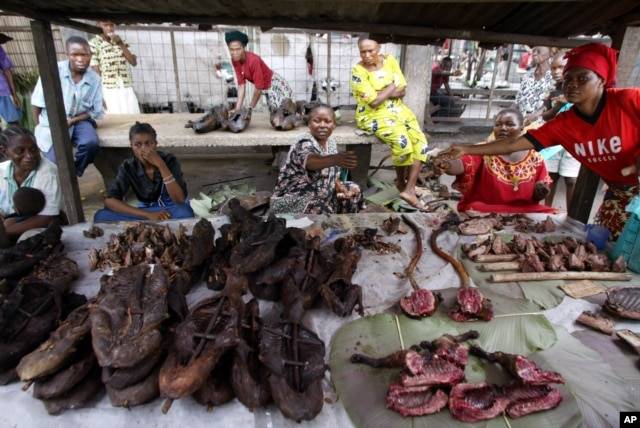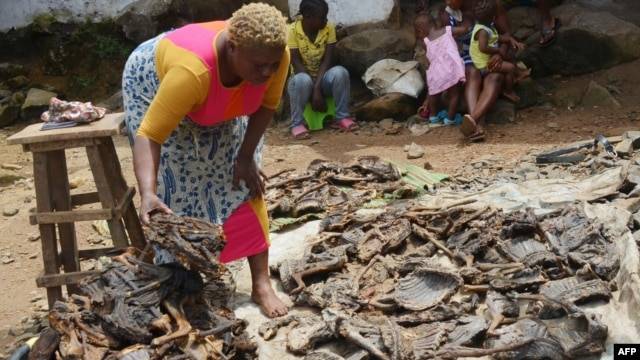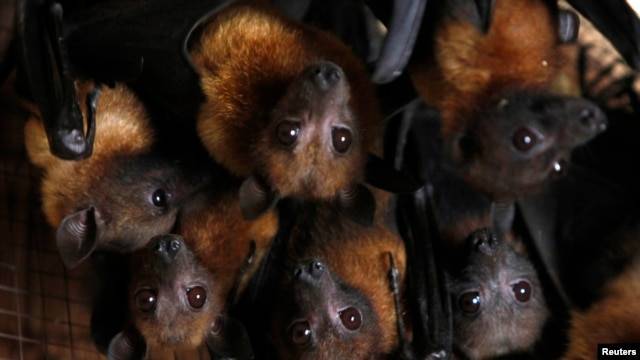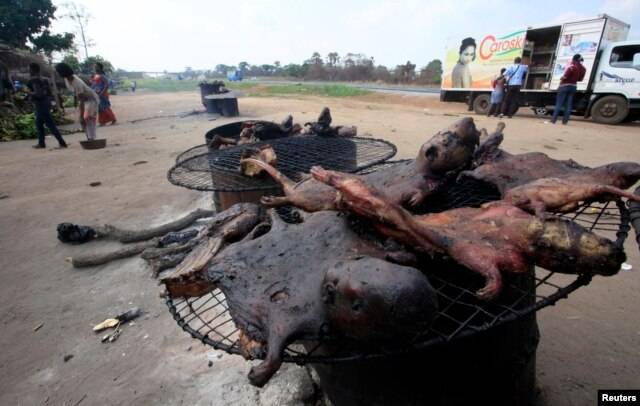casablanca
Rookie
- Oct 8, 2014
- 8
- 0
- 1
comparing us health systems with third world health systems is an exercise in futility
Follow along with the video below to see how to install our site as a web app on your home screen.

Note: This feature currently requires accessing the site using the built-in Safari browser.
comparing us health systems with third world health systems is an exercise in futility
comparing us health systems with third world health systems is an exercise in futility


Woman sell monkey meat in a market in Kisangani in the Democratic Republic of Congo.
The origin has been traced to a two-year-old child from the village of Gueckedou in southeastern Guinea, an area where batmeat is frequently hunted and eaten. The infant, dubbed "Child Zero," died on 6 December 2013. The child's family stated they had hunted two species of bat which carry the Ebola virus. Bushmeat or wild animal meat covers any animal that is killed for consumption including antelopes, chimpanzees, fruit bats and rats. It can even include porcupines and snakes. In some remote areas it is a necessary source of food. In others, it has become a delicacy. In Africa's Congo Basin, people eat an estimated five million tonnes of bushmeat per year, according to the Center of International Forestry Research.

Alice Jallabah, head of a bushmeat seller group, holds dried bushmeat on October 7, 2014 in Monrovia, Liberia. The Ebola outbreak has resulted in a ban on eating bushmeat.
Ideal hosts
But some of these animals can harbor deadly diseases. Bats carry a whole range of viruses and studies have shown that some species of fruit bats can harbor Ebola. Via their droppings or fruit they have touched, bats can then in turn infect other non-human primates such as gorillas and chimpanzees. For them, like us, this can be deadly. Bats on the other hand can escape from it unscathed. This makes them an ideal host for the virus. Exactly how the virus "spills over" into humans is still not clear, says Professor Jonathan Ball, a virologist at the University of Nottingham. There's often an intermediate species involved, like primates such as chimpanzees, but evidence shows people can get the virus directly from bats, he told BBC's Inside Science.

Grey-headed flying foxes, a type of fruit bat, pictured in a house in the outskirts of Bangkok, Thailand.
But it is difficult for the virus to jump the species barrier from animals into humans, he adds. The virus first has to "somehow gain access to the cells in which it can replicate" by contact with infected blood. Most people buy bushmeat from markets once it has already been cooked, so it is those hunting or preparing the raw meat that are at highest risk. The current outbreak shows that, however difficult or rare it is, infection is clearly possible, though it must be remembered that each further infection, from Child Zero to today, has been caused by contact with an infected person.
Bitten and scratched
There has been talk of banning bushmeat, but that may simply drive it underground, experts have previously warned. Hunting bushmeat is also a longstanding tradition, explains Dr Marcus Rowcliffe from the Zoological Society of London, "It's a meat-eating society. There's a feeling that if you do not have meat every day, you haven't properly eaten. Although you can get other forms of meat, there's traditionally very little livestock production. It's not so different from Europeans eating rabbits and deer."

People walk near dried bushmeat near Yamoussoukro highway in Ivory Coas
In Ghana, for example, currently unaffected by the outbreak, fruit bats are widely hunted. To understand how people interact with this particular type of bushmeat, researchers surveyed nearly 600 Ghanaians about their practices relating to bats. The study found that hunters used several different techniques to kill their prey including shooting, netting, scavenging and catapulting. All hunters reported handling live bats, which often meant they came into contact with blood and in some instances were bitten and scratched.
'Healthy food'
I feel like I need a gallon-size jug of hand sanitizer every time I open this thread.